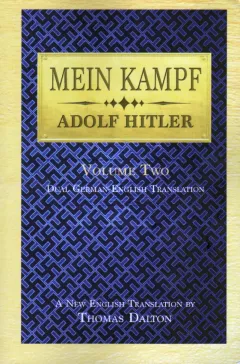Chapter 10, Vol II: The Mask of Federalism
summary
(I inadvertently skipped from Chapt. 9 to Chapt 11. For this new version of my website, I have changed the order of the posts, so Chapt 10 does not appear after Chapt 11. I have not changed the post dates. But give me credit that I had noticed it! -cy)
10.2 Until November 1918, the average man misunderstood what was happening, and didn't realize what the inevitable consequences would be of the internecine quarrel between North and South Germans. On the day that the revolution broke out, the leader and organizer of the revolution in Bavaria, the international Jew, Kurt Eisner, began to play off Bavaria against Prussia.
Eisner exploited existing antipathies in Bavaria as a means to break up Germany—believing the shattered Reich would then easily fall prey to Bolshevism. Eisner was not acting from Bavarian interests, but rather as a representative of Jewry. His tactics were continued for a time after his death in February 1919. The fight waged against the military contingents sent to liberate Bavaria was represented as a 'struggle of the Bavarian worker against Prussian militarism.' It bore rich fruit: The Communist parties went from only 13,000 followers to 100,000 after the fall of the Bavarian Republic of Councils.
10.3 It was then that I took the unpopular stand against the anti-Prussian incitement. One would have had to live through some of the meetings of that time to understand what it meant when, surrounded by only a handful of friends, I raised my voice against this madness at a meeting in the Munich Löwenbräukeller.
10.4 By insisting primarily on federalistic intentions as the sole motives of the agitation, the real tendencies were concealed. … But it's quite obvious that the anti-Prussian hatred had nothing to do with federalism. One cannot propagandize for a federalist form of the Reich by debasing, abusing, and besmirching the essential element of such a political structure, namely Prussia. … It's no surprise that they were careful not to attack the Jews, and this perhaps gives the solution to the whole riddle.
10.5 After the revolution, the Jew had to camouflage his campaign of plunder by provoking the so-called 'national' elements against one another: the conservative Bavarians against the equally conservative-minded Prussians. He acted with extreme cunning inasmuch as he provoked such crude and tactless aggressions that they set the blood boiling of those who were affected. ...The Bavarian didn't see the Berlin of 4,000,000 industrious and efficient workers, but only the rotten, decadent Berlin of the vilest West Side! (Jewish quarter)
In 1918 there was nothing like an organized anti-Semitism. ...Whenever we mentioned the word “Jew” we were confronted either with dumb-struck looks or a lively resistance. … The 'Watch and Resist League' at least had the merit of reopening the Jewish Question. ... Later on, the National Socialist movement presented the Jewish Question in a new light. The moment we succeeded in placing this problem before the German people in the light of a great, unified struggle, the Jew reacted [by] bringing up the ultramontane question [the legitimacy of the pope], (so) the resulting clash between Catholicism and Protestantism (would) distract public attention from an attack against Jewry.
10.6 Think how the process of racial disintegration is debasing and often even destroying the fundamental Aryan values of our German people, such that our national cultural creativeness is regressing and we run the risk, at least in our large cities, of sinking to the present level of southern Italy. Both Christian denominations look on with indifference at the desecration and destruction of a noble and unique creature who was given to the world by God's grace. ...Yet, the two Christian denominations are not fighting against the destroyer of this kind of man but are trying to destroy each other. ...In view of the religious schism that exists in Germany, to attack the essential characteristics of one denomination must necessarily lead to a war of extermination between the two denominations.
I have no hesitation in saying that these men who seek to embroil the folkish movement in religious quarrels are worse enemies of my people than any international communist. The National Socialist movement's mission is to convert the communists. … It's in Jewish interests today that the energies of the folkish movement are bled out in religious conflict. ...Only someone who is entirely ignorant of history could imagine that [this movement] can solve a problem that has defied the centuries and the greatest statesmen. In this way, our people have often been drawn away from the real problems of their existence … while others were carving up the world. Regarding that kind of 'folkish' warrior ... I pray with all my heart: “Lord, protect us from such friends, and then we can easily deal with our enemies.”
10.7 The struggle between federalism and centralization, so cunningly propagated by the Jews in 1919-1921 and onwards, forced the National Socialist movement to take a position on its essential problems.
What is a federal State? By this term, we mean a union of sovereign states that come together, of their own free will and in virtue of their sovereignty. They cede ... as much of their own sovereign rights as makes the existence of the union possible. In Germany, as opposed to the American Union, the individual states existed first, and the Reich was formed from them. In most of [the German] states, because of their small territorial size, it cannot be maintained that they ever enjoyed real sovereignty, and 'state sovereignty' was only an administrative phrase.
Bismarck's principle to only take from the individual states what was absolutely necessary for the Reich was a moderate and wise policy. It showed the highest regard for customs and traditions, and also ensured a great measure of love and willing cooperation. [It has turned out] that the Reich's sovereignty has continually increased at the cost of the sovereignty of the states, fulfilling Bismarck's expectations.
10.8 The abolition of the monarchical State form and its representatives dealt a hard blow to the federal character of the Reich, and even worse was the acceptance of the obligations that resulted from the peace treaty. ...The subsequent steps that led the Reich to take over the postal service and railways were necessary effects of enslaving our people, initiated by the peace treaties.
[...]
Blame must be placed on those men and parties that failed to do everything possible to win the War … especially in Bavaria. … It was an unparalleled example of hypocrisy to raise the cry of lamentation over the loss that the federal states suffered in being deprived of their sovereign rights.
[...]
The lack of sympathy for the Reich political idea isn't due to the loss of state sovereign rights, but rather is a result of the deplorable manner in which the State represents the German people. … Its constant desire to protect itself against its own citizens by means of laws and imprisonment provides the most destructive criticism of the whole institution. (! And this coming from the man who is blamed for turning Germany into a police state?!! No, he did not. -cy)
10.9 The chief characteristic difference between the present Reich's policy and that of former times is this: The old Reich gave internal freedom and showed strength towards the outside world, whereas the Republic shows weakness outside and oppresses its own citizens at home. In both cases, one attitude determines the other; a vigorous national State needs fewer internal laws because of the affection and attachment of its citizens, while an international slave state can live only by coercing its citizens to render their labor.
[...]
The republic, having no sense of tradition or respect for past greatness, dragged those symbols through the mud, and will one day be surprised to discover the superficial devotion of its citizens to its own symbols. … The National Socialists would reverse this formula and adopt the following rule: A strong national Reich that recognizes and protects its citizens' interests to the greatest degree can allow freedom at home without trembling for the safety of the State.
10.11 We National Socialists feel it our duty to energetically oppose centralization in the modern State [such as railways, postal service, finances], especially when the proposed measures mask a disastrous foreign policy. … Hence the struggle against the present centralization of vitally-important institutions, undertaken only to facilitate payment of billions of marks and other collateral for our post-war foreign policy.
The second reason we oppose such centralization is because it might reinforce a system of internal government that has brought the greatest misfortune on the German nation. The present Jewish-democratic Reich is seeking to negate the criticism offered by the federal states … by reducing them to total insignificance.
The third reason is the conviction that a large part of this so-called nationalization is only a means of removing certain institutions from sovereign control of states, in order to open the doors to the interests of the revolutionary parties. …Jews especially have been obtaining positions in economic institutions and administrative apparatuses taken over by the Reich, such that today both have become domains of Jewish activity.
This last consideration obliges us to sharply examine every further attempt at centralization and to fight it at every step. But our standpoint must always be that of a lofty national policy and never a petty particularism. … For us the State is nothing but a form; its content—that is the nation, the people—is the essential thing.
End of Chapter 10
- Printer-friendly version
- 423 views





